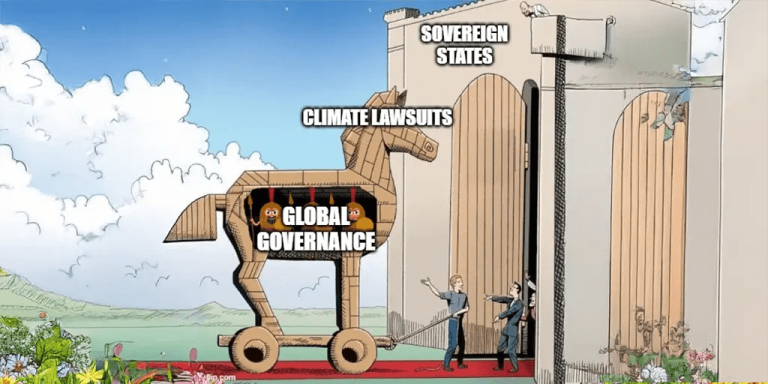In an unprecedented move, 99 countries gathered at the International Court of Justice (ICJ) in The Hague to seek an advisory opinion on climate change. Led by countries such as Vanuatu, the legal movement is asking the International Court of Justice to define states' obligations to combat climate change and protect vulnerable states. Supporters hailed it as a milestone in the fight against global warming, while skeptics questioned its motives, effectiveness and potential consequences. Let’s unpack this landmark case and consider whether it’s just another Trojan horse used to sweep for global control.

Case: Climate Liability Trial
The case stems from a resolution passed by the United Nations General Assembly urging the International Court of Justice to clarify the legal responsibilities of states on climate change. It focuses on two key questions:
- To what extent do countries have a legal obligation to curb emissions and mitigate climate change?
- What compensation should be given to countries disproportionately affected by climate impacts, especially small island states facing rising sea levels?
Although the ICJ's advisory opinions are not legally binding, they can establish powerful precedents that influence future climate negotiations, litigation and policy.
Driving force: island nation’s desperate move
Island nations such as Vanuatu have long been outspoken about their vulnerability to rising sea levels and extreme weather. They argue that wealthy industrialized countries bear a disproportionate share of the blame for the “climate crisis” and must take immediate action to correct the damage.
To those who are indoctrinated, their rationale may seem compelling: Why shouldn't major polluters compensate those most affected? But if you dig deeper, the water becomes cloudy. Sea-level data, for example, show trends that are far less consistent than alarmists suggest, with changes influenced by natural phenomena such as tectonic activity and ocean circulation. Furthermore, attributing global temperature changes solely to human emissions ignores the complexity of the climate system and the important role of natural variability.

What's really at stake?
The case isn't just about sea levels or compensation, it's about power. If the ICJ sided with the plaintiffs, it could encourage future litigation and create a de facto global emissions regulatory framework. Here's why this should give everyone pause:
- National sovereignty at risk
The ICJ’s opinion could undermine national sovereignty, allowing unelected judges to decide climate policy. Countries such as the United States and China that have boycotted binding international agreements may view this as an ultra vires violation of their right to self-determination. - Financial bottomless pit
A ruling in favor of the island nation could pave the way for trillions of dollars in climate compensation. Rich countries will face growing demands for financing adaptation programmes, potentially diverting resources away from domestic priorities. Worse, such payments can encourage corruption and mismanagement in recipient countries, which often lack transparency and accountability. - legal chaos
If emissions become the basis for liability, it opens the floodgates to endless litigation. The potential defendants are numerous, from corporations to individual governments. This is not justice; this is not justice. It’s a lawyer’s dream and a policymaker’s nightmare.
Questionable precedent: Historical climate litigation
The ICJ case is not the first attempt to weaponize the court in support of climate action. Similar efforts produced different results:
- Urgenda Foundation v. Netherlands (2019): A Dutch court has ruled that the government must reduce emissions to meet climate targets. The ruling was hailed as a victory but sparked a backlash over prioritizing climate goals over the democratic process.
- Juliana v. United States (2015): Young Americans are suing the U.S. government for failing to protect them from the effects of climate change. Despite its drama, the case became mired in procedural disputes, highlighting the limits of judicial activism.
These cases demonstrate that courts are ill-suited to address complex, multifaceted issues such as climate change. Solutions require democratic debate, open scientific inquiry and technological innovation, not judicial mandates.
Who benefits?
Follow the money and things will become clearer. International climate litigation is in the interests of:
- global bureaucracy
Organizations like the United Nations thrive on expanding their influence. Translating climate issues into legal obligations strengthens their role as global policy arbiters. - Influential developing countries
Some developing countries position themselves as victims, hoping to receive huge compensation from rich countries, effectively subsidizing their own development agenda under the guise of climate justice. - climate activist
Lawsuits give activists a high-profile platform to push their agenda, bypassing political opposition and public skepticism.
The real agenda behind the lawsuit
The ICJ case may be dressed up as a battle for justice, but scratch the surface and it looks more like a power grab. This is not about protecting fragile states, but about imposing a global climate regime that overrides national sovereignty, drains taxpayers’ wallets, and enriches the global elite.
Relevant
